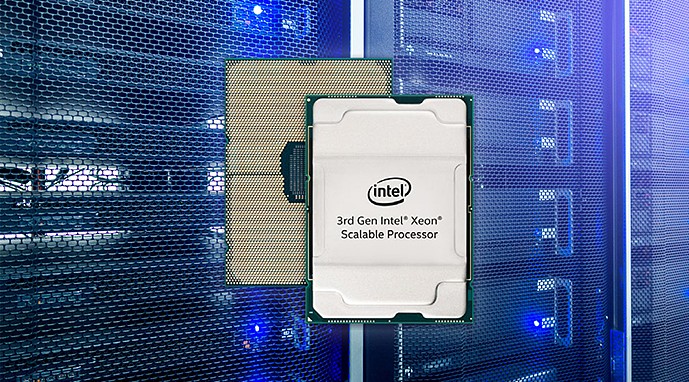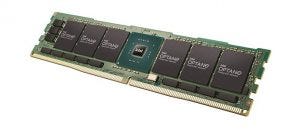The new data center processors are designed for HPC, AI, edge and 5G.
April 7, 2021

Intel has launched its 3rd Gen Xeon Scalable processors, which the company described as its most advanced data center platform. During a virtual launch event on Tuesday, Intel said it is now shipping its long-anticipated processor, code-named “Ice Lake.”
Ice Lake is designed for high-performance computing (HPC), intelligent edge, artificial intelligence (AI) and powering 5G network solutions. Embedded with AI accelerators, the new processors include Intel’s new Optane Persistent Memory 200 Series, available with up 6 terabytes of memory per socket. The persistent memory bandwidth is 32% greater than the previous version, according to Intel.

Intel Optane Persistent Memory 200 series
The Ice Lake processors are available in configurations ranging from 8 to 40 cores, with support for PCIe-Gen4, which provides high-speed data interfaces to storage and network components. Intel claims the new processors provide an average 46% performance boost over its 2nd Gen Xeon processors. Also new in its latest Xeon processors are embedded AI acceleration and enhanced security with support for its Software Guard Extension (SGX) and Crypto Acceleration.
Intel said it already shipped 200,000 units in the first quarter of this year. Now, the company’s broad ecosystem can start broadly selling new wares based on the 3rd Gen Xeon Scalable processor. Major servers and network equipment suppliers, cloud providers and telecommunications carriers are planning to incorporate Ice Lake into their offerings.
“This new processor family offers a flexible architecture that delivers built in AI acceleration and advanced security capabilities that are so necessary in a world of workload diversification and growing complexity,” said Intel CEO Pat Gelsinger.
Here’s our most recent list of new products and services that agents, VARs, MSPs and other partners offer. |
“We have a broad range of SKUs optimized to meet all customer requirements from the edge to the network to the cloud,” added Navin Shenoy, EVP and general manager of Intel’s data platform group.
Security Enhanced with SGX
Intel also is bringing its SGX hardware-based trusted execution environment (TEE) technology to the new processors. Until now, Intel’s SGX was only available for its Xeon E processors, designed for entry-level servers.
Now available for its 2-socket Xeon Scalable processors, SGX can isolate and process up to 1 terabyte of code. SGX makes it possible to use aggregate data sets while still securing and keeping data private, according to Shenoy. The ability to isolate data sets into secure enclaves enables the use of aggregate information without using personally identifiable data.
Enabling Confidential Computing in Microsoft Azure
Among those implementing Intel’s Gen 3 Xeon Scalable processors is Microsoft, which is using it to enable confidential computing. Microsoft Azure CTO Mark Russinovich appeared at the launch to preview its offering of confidential computing with the new processors. Microsoft has piloted this capability with several customers, including RBC Bank, for multiparty computing simulations.
“We consider confidential computing as an extension of our general-purpose fleet,” Russinovich said. “And on top of these new Intel processors, we’re also going to be offering …
… new general-purpose, as well as large-memory virtual machine sizes that offer better price to performance ratios than any virtual machine we’ve ever had in our fleet.”
Russinovich also announced last month that Microsoft has partnered with AMD and is using its new EPYC 7003 series processors.
Expanding Cloud Infrastructure
Besides Microsoft, Shenoy said every major cloud provider plans to deploy the new processors. Also making an appearance was Oracle Cloud Infrastructure EVP Clay Magouyrk. Oracle has worked with Nissan to perform crash simulations.

Oracle’s Clay Magouyrk
“The new Intel Xeon processors give a much higher performance that enables those workloads to be run in a much quicker way,�” Magouyrk said.
Oracle also is using the new processors to power its new flexible VM offering, he added.
“What we’re doing is we’re enabling customers to separate out memory and core usage so they can create the right VM they need for their workloads,” Magouyrk said.
Oracle’s new VM offering is now in preview; expect it to be available by April 28.
Under Pressure
Analysts have noted for some time that Intel has been under pressure to offer high-performance processors for data center infrastructure. Rival AMD, which has gained momentum in recent years, launched its 3rd Gen EPYC processors just three weeks ago. In a research note, analyst Jack Gold of J. Gold Associates said the release of the Gen 3 Xeon processors is a major effort to reestablish its industry leadership position.
“The need for high-performance processing has never been greater, with AI, 5G, cloud and Edge workloads all growing,” Gold noted. “Also, security and privacy initiatives like confidential computing are growing. Intel is targeting 3rd Gen Xeon Scalable at many of those workloads with accelerators and enhancements, including AI Boost, SGX, and partnering on confidential computing with Microsoft Azure. All of these will be big in the market.”
Read more about:
VARs/SIsAbout the Author(s)
You May Also Like


